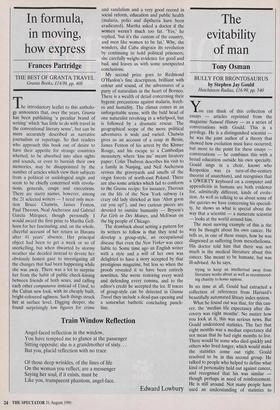In formula, in moving, how express
Frances Partridge
The introductory leaflet to this antholo- gy announces that, over the years, Granta has been publishing 'a peculiar brand of writing' which 'has little to do with travel in the conventional literary sense', but can be more accurately described as narrative journalism or reportage. So that readers who approach this book out of desire to have their appetite for strange countries whetted, to be absorbed into alien sights and sounds, or even to burnish their own memories, may be disappointed by the number of articles which view their subjects from a political or sociological angle and seem to be chiefly concerned with revolu- tions, generals, coups and executions. There are starry names, however, among the 21 selected writers — I need only men- tion Bruce Chatwin, James Fenton, Paul Theroux, Neal Ascherson and Gabriel Garcia Marquez, though personally I would award the first prize to Martha Gell- horn for her fascinating, and, on the whole, cheerful account of her return to Havana after 41 years' absence. Her principal object had been to get a week or so of snorkelling, but when thwarted by stormy weather she decided instead to devote her obviously honest gaze to investigating all the changes that had been happening while she was away. There was a lot to surprise her from the habit of public cheek-kissing between friends of both sexes, and calling each other companeros instead of Usted, to the Cuban new look, with its cheaply built, bright-coloured ugliness. Such things struck her at surface level. Digging deeper, she found surprisingly low figures for crime
and vandalism and a very good record in social reform, education and public health (malaria, polio and diptheria have been eradicated). Martha asked a doctor if the women weren't much too fat. 'Yes,' he replied, 'but it's the custom of the country, and men like women to be fat.' Why, she wonders, did Cuba disgrace its revolution by continuing to hold political prisoners; she carefully weighs evidence for good and bad, and leaves us with some unexpected conclusions.
My second prize goes to Redmond O'Hanlon's fine description, brilliant with colour and sound, of the adventures of a party of naturalists in the heart of Borneo. There is a wealth of detail concerning their hygenic precautions against malaria, leech- es and humidity. The climax comes in an unforgettable scene, with the bald head of one naturalist revolving in a whirlpool, but is followed by a dramatic rescue. The geographical scope of the more political adventures is wide and varied. Chatwin gives us an account of a coup in Benin, James Fenton of his arrest by the Khmer Rouge, and his escape to a Cambodian monastery, where 'kiss me' meant lavatory paper; Colin Thubron describes his visit to a family in Nanjing, and Neil Ascherson revives the graveyards and smells of the virgin forests of north-east Poland. There are also some articles which fail to conform to the Granta recipe: for instance, Theroux on the life of the New York subway (a crazy old lady shrieked at him `Ahm goon cut you up!'), and two curious pieces are devoted to outsize humanity — Bryson's Fat Girls in Des Moines, and McEwan on the big people of Chicago.
The drawback about setting a pattern for its writers to follow is that they tend to develop a group-style, an occupational disease that even the New Yorker was once liable to. Some time ago an English writer with a style and a will of her own was delighted to have a story accepted by that prestigious magazine, but less so when the proofs revealed it to have been entirely rewritten. She wrote restoring every word and defending every comma, and to the editor's credit he accepted the lot. If traces of group-style can be detected in Granta Travel they include a dead-pan opening and a somewhat bathetic concluding punch- line.










































 Previous page
Previous page